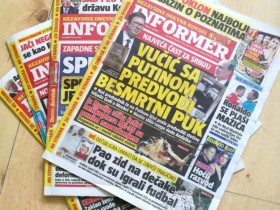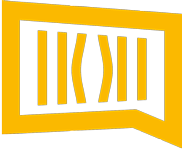From its establishment in March 2016 to the present date, the Srpski telegraf daily received 12.1 million dinars at 21 media competitions, while the Informer received 10.9 million dinars at 15 competitions since 2017. Both tabloids received the funds in Belgrade and at the territory of Vojvodina.
In the course of 2016 and 2017, the Informer was the record-holder with 25 publicly pronounced warnings by the Press Council for violation of the Code of ethics of journalists of Serbia. It is followed by the Srpski telegraf with 11 warnings pronounced in the same period.
According to the Rulebook which prescribes criteria for evaluation of media projects, which was passed in 2014 by the then minister of culture and information Ivan Tasovac, projects achieving public interest should be given priority in allocation, with guarantees that the media outlet adheres to professional and ethical standards.
This means that commissions which decide on financing need to take into account data of the Press Council when allocating funds to print and online media, that is, measures of the Regulatory body for electronic media (REM) when deciding on TV and radio stations.
These rules did not mean much for the Belgrade commission which allocated money to both tabloids in 2017.
The Srpski telegraf received five million dinars for the project entitled „Beogradski čovek” („The Belgrade man”). The two sentences of justification of the commission do not contain a single word on whether its members took into consideration the official letter of the Press Council which was filed to them and which read that, at the time the competition was published, this media outlet had already been issued four public warnings.
The Informer received three million dinars in Belgrade, despite the warnings of the Council. Another amount of two million dinars was allocated to company Info it media, owned by Dragan J. Vučićević, owner and editor of the Informer.
The two companies owned by Vučićević received money for two very similar projects, both of which were realized in the Informer: while Info IT media proposed the story „An interview with the Mayor – what was done between two celebrations of the Day of liberation of Belgrade”, company which owns Informer – Insajder tim – proposed to publish the first story entitled „Belgrade flourishes between two celebrations of the Day of liberation of Belgrade”.
.jpg)
This justification of the commissions, which they provided in a number of cases, is similar to a surgeon killing several consecutive patients who gets a pay raise and then you expect this to improve his standard, so his hand will not be as shaky and he would spare the others.
Tamara Skrozza, member of the Complaints commission of the Press Council
Photo: presscentar.rs
Both companies proposed to report on BEMUS, October Salon, FEST, migrants, growth of the birth rate, and reconstruction of city streets. The activity entitled: „How much the City of Belgrade allocated as assistance to new mothers and unemployed pregnant women” was contained in both projects, as well as reporting on the newly established utility portal of the capital.
Besides these two tabloids, the Belgrade commission also awarded the Tabloid Alo, which had already been issued four warnings for breaching the Code, with five million dinars.
At the same open call, no money was awarded to Pištaljka portal which wanted to write about corruption and conflict of interest in executive bodies of the City and city municipalities, with justification that the project is based on investigations which do not contain clear facts which would be of interest for citizens. The same commission denied funds for projects of the Danas daily, Beta agency, Novi magazine weekly, and NUNS Media Centre, which had not received a single warning of the Press Council or REM.
„Things are quite clear here, pro-governmental media outlets receive funds from state commissions at state competitions”, says Tamara Skrozza, member of the Complaints commission of the Press Council. She adds that this is not about observance or violation of the Code, but support to the authorities.
Milan Lađević, editor-in-chief of the Srpski telegraf, says for CINS that his paper won the money because of the quality of its projects, and that nobody had any comments against that.
„Here we have a chase by a certain group of media outlets which were not successful at those competitions. They think they will achieve something with pressures, but they had better provide a quality project”, says Lađević.
Unlike the Belgrade commission, commissions throughout Vojvodina allocated money to Srpski telegraf with justification that they believe this would help the tabloid observe the Code more, while most commissions fully ignored decisions of the Press Council.
By the time of publishing of this story, Dragan J. Vučićević did not reply to questions asked by CINS on how it is possible for the Informer to win money at competitions when his paper violates ethical standards.
Decisions of the Press council not important?
„We shall be the real people paper, neither pro-regime, nor opposition, we shall not incline either to the East or the West. We want and we shall do our best to serve citizens and the public, a national, pro-Serbian service”, said Milan Lađević, editor-in-chief of the Srpski telegraf before the first issue was published in March 2016.
Soon after that, the Independent newspapers Srpski telegraf gained popularity with tabloid headlines and reporting which was frequently in favour of political parties in power. In only nine months of its existence, this tabloid became the record holder among daily papers by the number of stories in which the Code was violated – according to the Press Council monitoring, in 2016 this happened as many as 1,320 times.
In the same year, the Complaints commission of the Press council pronounced the Srpski telegraf five public warnings for breaching the Code.
The Commission, comprising 11 members, representatives of media and media associations as well as the civil society, decides on complaints which the injured party submits due to violation of the Code in print and online media. Media outlets to which the compliant is addressed have the right to justify the reasons for their reporting, after which the Commission decides by a majority vote on whether the Code was violated or not.
The first warning for the Srpski telegraf was issued only two months after the first issue, when the stories with the following headlines were published: „Gays spread AIDS in Serbia”, and „Gays are sick. This problem needs to be eradicated”.

Milan Lađević, editor-in-chief of the Srpski telegraf, says for CINS that his paper won the funds at competitions because of the quality of its projects, and that no one had any objections to that.
Photo: Taken from the twitter account @ladjevic
In his reply to the complaint, Milan Lađević, editor-in-chief of the paper, said that it is nonsensical and ungrounded, as the paper did not promote hate speech against the LGBT community, and that the disputed headlines were actually published in the interest of the gay community.
Only several months as of its establishment, the Srpski telegraf started concluding contracts with institutions – Belgrade Municipality of Stari grad paid it 300,000 dinars in the end of April; somewhat later, the same amount was paid to it by Leskovac and Šabac.
In the first year of its existence the Srpski telegraf received 2.7 million dinars from the state through various commercial contracts. In the end of the year, the paper received its first money based on a public competition – 250,000 dinars in Sremska Mitrovica. In the following year already, it managed to get 10.8 million dinars at 18 competitions; in April this year, it received another million dinars in Pančevo and Stara Pazova.
Competitions were introduced as obligatory in 2015, as the Law on public information prescribed that funds from the budget are to be allocated to media outlets in this manner so as to stimulate them to produce content of public interest, and not only commercial content.
In the course of 2017, the Commission of the Press council pronounced six pubic warnings to Srpski telegraf, while the monitoring report of the Council for the period March-November indicated that the paper published 1,282 stories in violation of the Code, which was again the highest figure among daily papers.
Money to Srpski telegraf to observe the Code
In March 2017, small Banat municipality awarded Srpski telegraf 250,000 dinars for the project „Public information in Plandište”; the tabloid initially requested almost 500,000 dinars for the purpose.
The commission also took into consideration the measures pronounced by the Press Council: „however, the opinion that the applicant’s statement on measures and activities taken was sufficiently persuasive prevailed among the members of the commission; on the other hand, with this decision, the Commission wants to support the applicant in its endeavor to adhere to the recommendations of the Press Council and implement them in its work in future”.
The trust of the commission in the Srpski telegraf was not justified, as the tabloid was issued warnings even after this.
The commission of the Municipality of Vrbas, which allocated the Srpski telegraf 100,000 dinars for the project „Vrbas – timely information” was of a similar opinion, as well as the commission of the Municipality of Kikinda which allocated it 475,000 dinars for the project „Stories from Kikinda”.
Commissions in Vojvodina – same people every time
The analysis of all open calls at which the Srpski telegraf received money indicates that 11 out of 21 commissions comprised the name of Vladimir Jovanović from the Association of tourist journalists and writers in Serbian tourism – FIJET. In the case of the commissions which allocated money to the Informer, Jovanović was a part of seven out of 15 competitions.
Cenzolovka portal wrote about Jovanović as the record-holder by his participation in commissions in Vojvodina; in 2017 he participated in distribution of funds at 16 competitions, mostly as a representative of FIJET; this is more than one third of the local self-government units in Vojvodina which implemented competitions.
According to Cenzolovka, Jovanović used to work with TV Novi Sad which he left in 2017 to establish his own production Media info centar. This newly founded company was awarded about eight million dinars at four competitions in 2017. Meanwhile, Marko Carić became one of co-founders of the Business academy in Novi Sad.
Vladan Stefanović was a part of eight commissions which allocated funds to the Srpski telegraf; he was featured as a representative of FIJET, Association of radio stations RAB Serbia, and Association of electronic media ComNet.
What is also a common feature of all competitions where the Srpski telegraf won funds was the fact that local self-government units kept refusing to feature in their commissions members of the Media coalition of associations of journalists comprising UNS, NUNS, NDNV, ANEM, and Lokal press.
In all three cases, the commissions were familiar with the measures of the Press council, but kept ignoring them. At the same time, three totally different commissions provided almost the same justification, using identical sentences and quoting they believed that the decision on financing supports the media outlet in adhering the recommendations of the Council.
At the same time, in 2016 the commission in Vrbas passed an opposite decision in the case of TV station KCN (Kopernikus cable network), which, among other reasons, it was denied money as a result of the measures pronounced to it by REM.
Tamara Skrozza says: „This justification of the commissions, which they provided in a number of cases, is similar to a surgeon killing several consecutive patients who gets a pay raise and then you expect this to improve his standard, so his hand will not be as shaky and he would spare the others”.
In the Municipality of Apatin, the commission received an official letter of the Press Council which read that the Srpski telegraf had received eight public warnings in the period of one year before the competition was published.
The commission also received the official letter signed by Ljubomir Dabović, manager of the company Medijska mreža – publisher of Srpski telegraf. In the first lines of the official letter, it is written that the company does not recognize competence of the Press council „due to reasonable doubt as to impartiality and grounds for work of this citizen association, and the manner of appointment of members in bodies of the Press Council itself”.
Dabović mentioned the case of reporting on the topic of LGBT rights and why his tabloid received three warnings, stating that journalists „supported their positions in relation to LGBT population with arguments and facts”.
Some of these stories from 2016 had the headlines such as: „Darling don’t be a fag” and „Gays hid a weapon arsenal”.
Following this, the Srpski telegraf continued with its offensive reporting on the LGBT population, which is why it was issued new warnings in 2017.
Despite the fact that this is publicly available information, the commission decided that the project „Public information in Apatin” should be awarded 217,000 dinars, while the justification does not mention whether violation of the Code was discussed.
„As far as the NGO Press Council is concerned, I believe that they are actually a political organization which passes decisions based on the principle ‘this is the editorial policy I don’t like’”, says Milan Lađević, commenting the warnings of the Council; he adds that, in his opinion, „this Council has so far applied double standards and has a hypocritical attitude”.
On the other hand, Tamara Skrozza says that the Srpski telegraf and Informer „may or may not recognize the Press Council, but they must observe the Code of journalists of Serbia”. She explains that the Council also decides on media outlets which do not recognize its competence as it was recognized as a body which treats the issue of professional standards at national level.
Closing eyes before Informer’s warnings
“In this manner, I would like to state that Info IT media has not been pronounced measures by regulatory or self-regulatory bodies for violation of professional and ethical standards in the last year”.
This statement arrived on 7 February 2017 to the address of the Municipality of Bačka Palanka as a part of the application for a media competition.

In the course of 2016 and 2017, the Informer was a record holder with 25 public warnings pronounced by the Press Council for violating the Code of journalists of Serbia.
Info IT media was founded a month prior to this competition, had two employees, and was registered at the address which also hosted the newsroom of the Independent daily newspaper Informer. Info IT media is actually a company of Dragan J. Vučićević, which is also the editor, and – through the company Insajder tim – owner of the Informer.
Vučićević launched Informer in 2012, just before the Parliamentary elections in which Serbian Progressive Party was the winner; he presents his paper as „the paper with the largest circulation in Serbia.”
For the project „Guide through towns and municipalities in the Republic of Serbia – meet Bačka Palanka”, company Info IT media received 250,000 dinars.
In its justification, the commission emphasized that the „broad availability of information having in mind that the project is implemented through the Informer daily” gives the project a special value.
What the commission did not discuss was the 16 public warnings which the Informer received from the Press Council in the course of 2016.
The reason for this is the fact that the Municipality of Bačka Palanka did not even ask the Press Council as to the number of warnings issued to the Informer in the previous period. Although the official letter of company Info IT on the fact that it had no warnings was delivered to the commission, the company is formally not a media outlet, but was registered as an advertising agency, that it is not entered in the register of media outlets, and that it publishes its media content through the Informer, which is why the Council may not even issue it a warning.
The Council confirmed to CINS that neither Sremska Mitrovica nor Bački Petrovac, at the competitions of which the Informer was allocated money, did not request data on the pronounced warnings. They also stated that some municipalities request such information directly from applicants.
Through companies Info IT media and Insajder tim, the Informer tabloid earned 10.9 million dinars at 15 media competitions in the course of 2017 and 2018.
Following Belgrade, the Informer received the largest amounts of money from Novi Sad, Pančevo, and Stara Pazova, a million dinars respectively. According to the data of the Press council, the three commissions had data on the warnings pronounced to the Informer.
This project is financed by the European Union through the small grant project “Protection of media freedom and freedom of expression in the Western Balkans” implemented by the Croatian Association of Journalists within the regional project Regional platform for advocacy of media freedoms and safety of journalists in the Western Balkans, six journalists’ associations from the region – Independent association of journalists of Serbia, (NUNS),Association of BH journalists, Croatian Association of journalists, Association of journalists of Kosovo, Association of journalists of Macedonia, and Media Trade union of Montenegro



What do you think